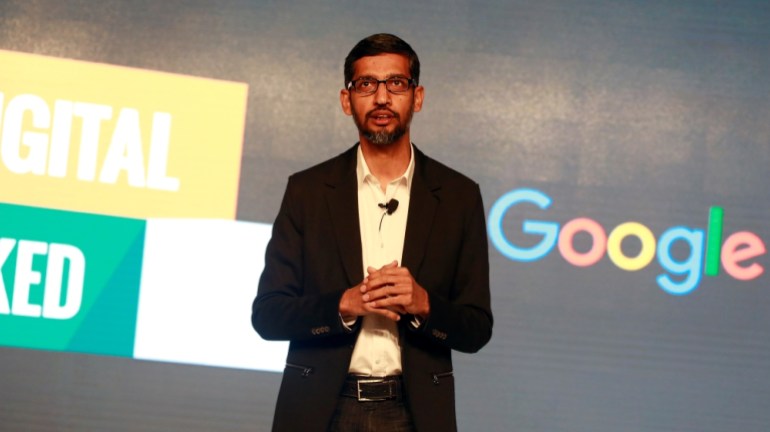2023, the year of layoffs
Despite widespread layoffs few CEOs took meaningful pay cuts and could actually get raises in the year ahead.

Carlin Putman of Houston, Texas worked at AIG for more than two decades. Earlier this year, she lost her job. She was devastated.
But the writing was on the wall for months as the company tried to cut costs.
Keep reading
list of 4 itemsJapan eases curbs on weapons exports, raises defence budget to record $56bn
Israel-Gaza war: Why are culture and society targets?
Israel’s AI-powered ‘mass assassination factory’
“No matter how much work we had, it was working off of bare bones,” Putman told Al Jazeera English.
Late last year, the insurance giant announced it would lay off hundreds of employees, including Putman.
“When you are reporting to the board, the less headcount you can show that looks better for them,” Putman said.
In 2022, AIG’s Peter Zaffino was the highest-paid CEO in the entire property and casualty insurance sector. He made more than $75m last year — most of which came from stock grants.
According to data compiled by research firm Equilar, that makes Zaffino the third-highest-paid CEO by revenue in all of corporate America.
AIG has not made any public commitment to its top bosses taking any kind of pay cut amid the layoffs. AIG did not respond to Al Jazeera’s request for comment.
AIG has yet to issue its proxy statement — the document a company releases as it solicits shareholder votes in advance of an annual shareholder meeting and which includes executive compensation for the year. AIG’s most recent was in March. Like most publicly traded companies, it will issue the next one in the first half of 2024.
Other companies did respond to Al Jazeera’s inquiries but said executive compensation has yet to be disclosed. T-Mobile for example said it will release the specifics of CEO Mike Sievert’s compensation package in April as did Pfizer, Morgan Stanley, Ford, GoDaddy and many others.
While corporate America was swift about layoffs, the consensus on executive compensation is to be determined, indicating they could rise. That sends a mixed message about the state of the economy heading into the 2024 presidential election.
High layoffs amid record job growth

In January, Salesforce laid off approximately 10 percent of its workforce. CEO Marc Benioff blamed economic conditions.
The layoffs came despite record job growth in the United States. In 2022, the US economy added 4.5 million jobs — the second-highest in 40 years. Excluding this month, data for which is not yet available, the economy added more than 2.5 million jobs in 2023.
In October, The White House touted inflation slowed by 60 percent since its peak in June 2022.
Concurrently, Salesforce reported $8.2bn in revenue in the first quarter.
“CEOs often get rewarded for layoffs because Wall Street sees it as a sign that the chief executive is taking the tough action to ensure that the company is mean and lean so often they will see a bump in their share price after a layoff,” Sarah Anderson, director of the Global Economy Project at the Institute For Policy Studies, told Al Jazeera.
“In that kind of context, there is no way that shareholders are going to be calling for the CEO’s head or even reducing their bonuses because shareholders are happy when the stock price goes up,” she added.
In a letter to staffers, Benioff said in part “we hired too many people leading into this economic downturn we’re now facing, and I take responsibility for that.”
Yet analysts like Wedbush’s Dan Ives called Salesforce first Q1 results a “masterpiece”. Marc Benioff made the rounds on business news TV to tout its earnings report and was rarely questioned about the massive job cuts even as Benioff’s pay increased 4 percent in 2022, according to Equilar data.
Salesforce has added more than 3,000 jobs since the recent cuts. Benioff did not commit to taking any pay cut. Salesforce did not respond to Al Jazeera’s request for comment.
Despite tailwinds in the US economy over the last two years, according to Layoffs.fyi — a platform that tracks tech industry layoffs — there were more than 260,000 layoffs in the sector.
According to a report from Challenger, Gray and Christmas, there were roughly 20,000 layoffs in the media industry in 2023. The same report found the retail sector cut 78,000 jobs and the healthcare industry cut roughly 57,000.
Salary cuts not always noble

Despite thousands out of a job this year, seldomly are c-suite executives taking any kind of a pay cut. Al Jazeera evaluated more than 90 companies across multiple industries to see who opted to take a pay cut publicly this past year.
Several companies announced that its CEOs would take pay cuts. In February, Twillio announced its CEO, Jeff Lawson would take an almost 50 percent pay cut. Micron Tech announced that its CEO would take a roughly 20 percent pay cut. Goldman Sachs’s David Solomon announced he would take a pay cut, as well. Alphabet’s Sundar Pichai said he would not take a bonus this year.
How meaningful those are, varies. For instance, Pichai’s announcement only comes after a huge compensation rise for 2022. According to Equilar data, that was a 3,474 percent increase over the year prior.
The most notable cut was at Zoom Communications. Its CEO, Eric Yuan made headlines earlier this year after he announced that he would take a 98 percent pay cut amid layoffs at the video conferencing giant which surged in popularity of the program in everyday life during the COVID-19 pandemic. He took responsibility for overhiring.
For executives taking pay cuts is not always that easy of a thing to do because it can make the company look weak, thus impacting its stock price. Generally publicly traded companies are beholden to their shareholders through a concept called shareholder supremacy and companies can get sued if executives make decisions that are not in the best interest of its shareholders.
But salary cuts are not always as black and white as public relations campaigns make them seem.
Intel for example said it would “temporarily reduce base salaries for our CEO and NEOs 25% and 15%, respectively, with 2023 target bonuses based on the new blended salaries (certain months at prior salary and certain months at reduced salary),” in its most recent proxy statement.
But experts have suggested that that is not always as noble as it seems.
“Where they [CEOs more broadly] are taking cuts is what we need to understand. If they are taking cuts in salary, that’s really the most significant, it’s just the most obvious that people see,” Harikumar Sankaran, professor of finance at New Mexico State University told Al Jazeera.
In the case of Intel, the tech giant cut out cash bonuses for its CEO, Pat Gelsinger. However, the Silicon Valley-based tech giant enhanced the role its stock plays in its executive compensation package.
“A lot of executives with great fanfare announced they were not taking a salary but then when we looked at total compensation, it was just as big as the year before,” Anderson said.
“It is only better than nothing if it’s a meaningful cut in their total compensation. If it is just window dressing in terms of a small cut in base pay, they are going to make out like bandits with their equity-based pay.”
According to the company’s most recent proxy, CEO compensation topped $11.6m, $8.8m of which was in stock awards.
Intel also refocused its compensation commitment to focus more on “at risk” pay. Its proxy statement argued that it will “strengthen our pay-for-performance linkage, provide further alignment with stockholders’ long-term interests, and meet the cost cutting needs of our company given the continued macroeconomic headwinds we face.”
“If companies were to say they would not accept stock grants for the next two years, that would be a significant statement,” Sankaran said.
That said, how CEOs opt to compensate themselves ultimately does not change the increasingly strained financial situation for the hundreds of thousands of American workers who lost their jobs this year.